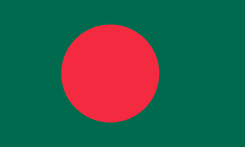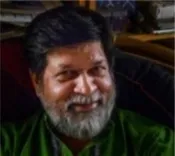

Shahidul Alam, a Bangladeshi photojournalist, social activist, and founder of Drik Picture Library (an independent media agency), Drik Trust focused on the media, and the Pathshala South Asian Media Institute – all independent self-reliant organisations that collaborate with donor organisations, NGOs, and civic groups. Legal proceedings were initiated against Alam for posting a video on Facebook about protests by Bangladeshi students calling for safer roads after two children were killed by a bus in late July 2018. Alam was charged under Section 57B of the Information and Communication Act (ICT) that was repealed and replaced by the Digital Security Act (DSA) of 2018. While working on the streets capturing the protests, he was attacked, and his camera was smashed. He returned to the protest site with new equipment and resumed broadcasting on Facebook on 05 August 2018. That evening, while uploading his footage and having a conversation with the BBC about an upcoming interview (he had given an interview to Al Jazeera earlier that day), he was ambushed and abducted by a group of individuals who he later claimed were allegedly from the Rapid Action Battalion. His first pushback was to make as make as much noise as possible and physically resist so that the authorities had to drag him in full view of people on the streets. By this he ensured he did not disappear quietly.
He was accused of disseminating false information, damaging the nation’s reputation, and disrupting law and order. However, during the case, various other allegations surfaced including the interview he had given to Al Jazeera and another accusation of fabricating information. Alam spent 107 days in custody and was denied bail several times even after the judge hearing the case noted that the prosecution had not presented any evidence to support their allegations. During interrogations, he was told he would be free if he stopped kept silent. He refused. This was his second pushback – not to cave in despite being tortured. More than five years have passed since his arrest and the law under which he was accused has been repealed, and the Act that replaced it, the DSA, has itself been replaced by the Cyber Security Act. His case should have been dismissed. Despite this, Alam must appear in court every month. This is legal harassment. He also endured smear campaigns.
His case exemplifies this trend of legal harassment of targets who are not just high-profile politicians or personalities but also non-partisan civic actors who are critical of the government civic actors and have a decent follower base on social media. As per Alam, during the broadcast on Facebook, he utilized both images and words, which likely amplified the impact of his statements. Additionally, his significant international and local audiences may have contributed to the attention his case garnered. Therefore, despite initial assumptions by the government authorities that they could silence dissent, his case demonstrated the power of collective protest and international pressure in holding authorities accountable. He also felt that the fact he did not take an NGO/CSO certification and did not rely on government funding helped to sustain his organisations otherwise they would have folded up. Even then, after his release, corporate funding dried up and barring very few, other funders and partners terminated contracts. The fact that he had some private wealth and maintained due diligence of his account books boosted his resilience strategy. For him, civic actors can be protected if the judiciary maintains its independence. He also blames competitive NGO environment where NGOs instead of supporting each other compete for funding. This prevents from presenting an institutionalized collective front against government repression. Since his release, he has been sharing his experience and trying to continue with his advocacy, building a network of allies as he sees this as the only way forward when the democratic check and balance system is weakened.